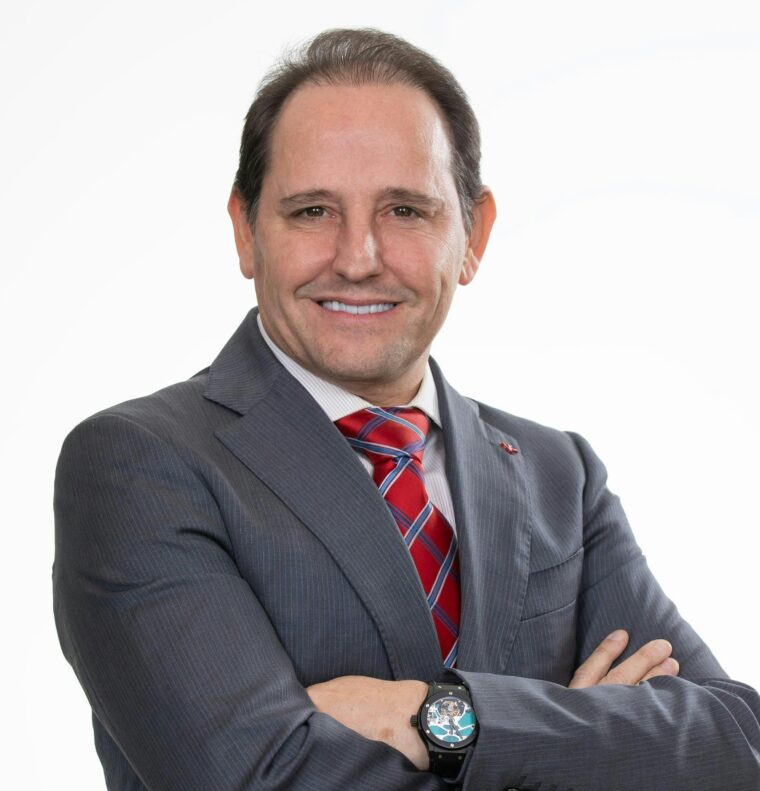Portuguese people who stand out abroad help to find out where business opportunities are and what kind of companies and activities the country can attract. An initiative that brings together Negócios and the Portuguese Diaspora Council.
1 – What led you to leave Portugal?
I left Portugal for the first time at the beginning of 2003, to work for L’Óreal in Paris as brand director for the Europe region. The main reason I left was because of the classic career path that senior managers in the L’Óreal group take. The normal thing in the L’Óreal group, where I’ve worked for over 26 years (I started as a marketing trainee in 1995), is to have a career in a country (as I did in Portugal), until you reach the position of, for example, marketing director or commercial director in that country. Then, before becoming general manager, it’s normal to have international experience, either at the group’s headquarters in Paris (my case) or in a different, larger market.
So I returned to Portugal where I was general manager of the professional products division at the beginning of 2006. I then held several general management positions in various businesses/countries (Belgium/Benelux, Spain, France), which enabled me to build up the experience, CV and knowledge I have today. After being general manager in Spain for six years, I decided that I wanted to live here in Madrid, where I still live, and stop moving countries with my family every three or four years. This life decision also led me to leave the L’Óreal group in 2021 to take on another project.
In fact, in 2021, I joined GHD, a British company based in London – owned by the American investment fund KKR – a world leader in the field of beauty tech hair, as General Manager EMEA (Europe, Middle East, Africa), but always living in Madrid and travelling to the headquarters in London or to the countries I’m responsible for from Madrid.
2 – What advantages or disadvantages has being Portuguese brought you?
Honestly, being Portuguese, apart from being a great source of personal pride, hasn’t brought me any particular advantages or disadvantages.
I may have had the small advantage of the element of surprise when, in 2003, I was brand director for the five largest countries in Europe for L’Óreal – I was one of the few non-French people in such a position.
But the truth is that, in a multinational environment like L’Óreal, a professional is always and only worth himself; nationality isn’t exactly a relevant factor.
I can say that being Portuguese gives me characteristics that play in my favour (other nationalities will have others, of course), such as adaptability, action orientation and the ability to uncomplicate and simplify problems.
3 – What obstacles did you have to overcome and how did you do it?
For the same reason, I’ve never felt any particular or relevant obstacle because I’m Portuguese. The only one I can mention is that Portugal, due to our size, certainly has a simple retail context in the world of consumption and cosmetics/beauty (department stores/perfumeries, for example) and we also don’t have the habit of international media/advertising productions. But this apparent obstacle also turns out to be an advantage, because professionally we have a mind with fewer a prioris, due to experience of what works and what doesn’t, and we have the vigilance and open-mindedness to learn and draw our own conclusions more objectively.
4- What do you admire most about the country you’re in?
I love living in Spain and especially in Madrid. The five things I admire most here are: firstly, the absence of unnecessary formalities in the business world (the Dr./Eng., very Portuguese); secondly, not being afraid to always express your opinion, up or down the hierarchy and in your environment or not. This attitude leads to better discussions, a greater wealth of opinions, more points of view and, in the end, better decisions; thirdly, they are proud of their country, region or city, and this can be seen in the food, the sport, the symbols; fourthly, politics here clearly has an economic/fiscal aspect and discussion, which is especially true, and resilience, not giving up and fighting for everything they believe in and want.
5 – What do you admire most about your company/organisation?
After a career of more than 26 years with the L’Óreal group, of which I am very proud, I am fortunate to now be working at ghd. In many cases, due to the nature of a more conservative company like L’Óreal, a company owned by an investment fund like KKR has a different approach to business, which gives me a very complementary learning experience in management – which is very rich for me as a professional.
The objectives are very simple, direct, clear and measurable, with no room for doubt. On the other hand, day-to-day life – meetings, discussions, decisions – are not ‘political’ and contribute to an end goal that is, as I said, very clear. And then, as a consequence, the responsibility and impact of each decision-maker is much clearer too. The objectives agreed with the board of directors and the way they are passed on to the executive committee and the business are then very aligned and direct. And this gives managers a lot of decision-making power.
On another level, at GHD, the company is the brand and the brand is the company, and this gives the business enormous synergies, as they feed off each other and maximise their mutual strength. Finally, since GHD is a leader in its hair beauty tech business and also has a very premium positioning, there are no compromises, neither with quality, nor with results, nor with safety. And, of course, you pay for that. But this is our choice and the consumer undoubtedly values it.
6 – What recommendations would you give to Portugal and its entrepreneurs and managers?
The best recommendation I can give to Portuguese entrepreneurs and managers is to, first and foremost, use their strengths, their companies and brands, their ecosystem, our country.
Firstly, as I’ve mentioned, our adaptability and action-orientation, as well as our ability to uncomplicate and simplify problems – this makes our managers very valuable professionals.
Next, we have to take advantage of what nature has to offer us, our geographical location, our climate, either to attract investment wherever and whenever this is a factor to be taken into account or, through these characteristics, to attract professionals to Portugal to set up their companies, businesses or centres of excellence there. Nowadays, it’s often more important than where we are physically that we are accessible and connectable.
Another factor that plays in our favour is the quality of our higher education. But we need to work on its image and attractiveness – see the excellent recent example of Nova SBE. And finally, security and a stable social climate.
But, on the other hand, we need to change what is harming us – excessive bureaucracy, excessive formality – and guarantee those who are going to invest stability and fiscal, legislative and legal certainty.
And finally, we must invest in the infrastructure that connects us to Europe (and the world) – Lisbon airport and the TGV.
7 – In which sectors of the country where you live can Portuguese companies find clients?
We have the quality and capacity to invest in any sector in Spain. As long as we have quality labour, the ability to make decisions and the will to do so, there’s no stopping us.
Of course, it may be natural to invest in markets that have traction here in Spain and that are somehow more ‘natural’ for us, such as tourism or retail, but also investments that allow us to export our ‘savoir faire’, such as footwear, fashion, catering or agriculture.
8 – What sectors in Portugal might companies from the country you’re in want to invest in?
Once again, I believe that there are many investment possibilities, many Blue Oceans, in Portugal for foreign investment, particularly Spanish investment.
From developing what already exists but taking the offer to the next level (because I believe there is still plenty of potential if done in an attractive, differentiating and innovative way), whether in tourism or specialised retail.
But I also believe that there is a lot to be gained in the health, ageing and well-being sectors. In addition, due to the quality of our professionals and our natural conditions, I believe that information technologies, sustainability and clean energies are also areas of strong opportunity in Portugal.
Finally, the infrastructures I mentioned earlier and everything directly or indirectly linked to them – Lisbon airport and the TGV.
9 – What competitive advantage of the country you’re in could be replicated in Portugal?
Following on from what we talked about, I think Spain’s main competitive advantages that we can replicate in Portugal are: major international transport infrastructures to improve and facilitate our accessibility and our place in Europe and the world; investment in specialised, innovative, differentiated and competitive retail, also on the high street and not just in shopping centres; a clear economic/fiscal policy, both in the country and in the main cities and regions, to attract investment, people, talent and wealth; strong and international branding of our higher education and finally a joint effort to reduce excessive formality in the country.
10 – Are you thinking of returning to Portugal? Why?
I don’t know about that… I love my country, but I also feel very comfortable living between Madrid and Lisbon, with a European, worldwide professional activity. It’s a balance that works very well for me at the moment. We’ll see in the future, but Portugal is and always will be my country wherever I am in the world, near or far.
Original article here.







